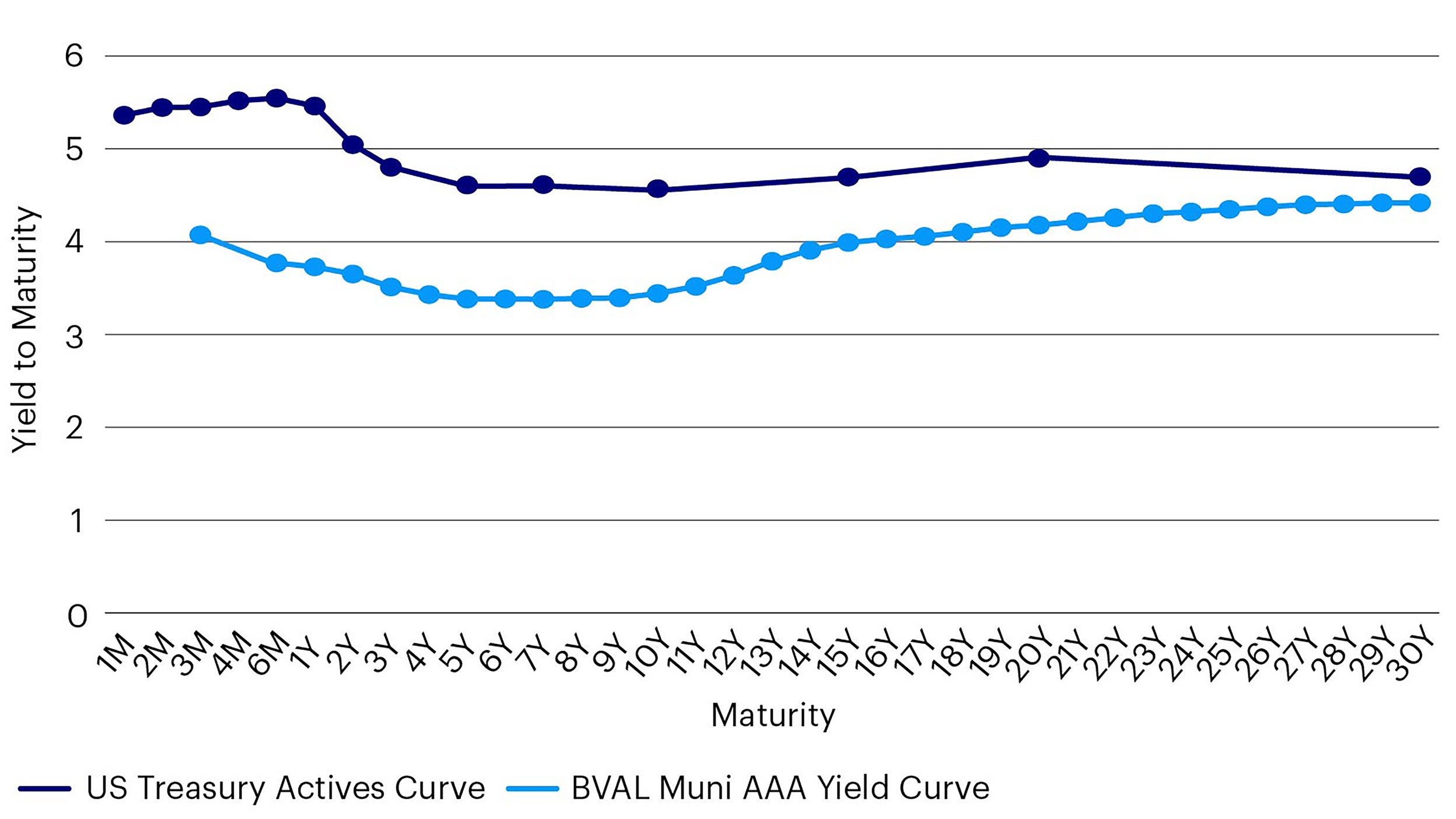ORNYX
Five reasons why municipal bonds are compelling now

Key takeaways
More favorable backdrop
A macroeconomic environment of low growth and decreasing inflation is potentially supportive of munis.
Attractive yields
Muni yields are at their highest levels in over a decade.
Supportive fundamentals
Fiscal stimulus and strong revenue collections have helped maintain robust muni credit fundamentals.
Five reasons why municipal bonds are compelling now
Between the regional banking crisis, debt ceiling melodrama that led to a further US sovereign rating downgrade, potential federal government shutdowns, heavy US Treasury issuance, and geopolitical risks, 2023 has been a tumultuous year in markets. That’s after 2022, which was marked by rising interest rates and high inflation. Despite these headwinds, the municipal bond market has demonstrated stability and resilience. We believe the asset class’s diversification feature is worth considering based on their low correlation to stocks and other risky assets. Here are five reasons to consider an allocation to tax-exempt munis now.
1. The macroeconomic environment should be less volatile ahead
The timeline and severity of a potential US recession has been downgraded amid low unemployment, strong consumer activity, and downward-trending inflation. While the Federal Reserve is still concerned about the pace of price increases, its fight to tame inflation has generally worked. Market expectations are mixed but point to the possibility of either one more rate hike in November or none at all. A macroeconomic backdrop of low growth and decreasing inflation is attractive for munis, particularly at today’s high yields.
2. Yields look attractive
Bond markets have returned to value, in our view, with nominal yields at or near their highest levels in over a decade (see chart below). Investment grade munis yield 4.32% and high yield municipals are yielding 6.25%, or 7.30% and 10.56%, respectively, on a taxable equivalent basis.1 Relative value has also returned to the muni market. The municipal-to-Treasury ratio, which compares the yield on an AAA-rated muni bond to a Treasury with the same maturity before adjusting for taxes, is currently 75% in 10 years and 92% in 30 years, indicating value for most taxpayers, especially toward the longer end of the yield curve, because the muni curve is steeper than the Treasury curve.2
Steeper yield curve indicates value in munis
Muni yield curve vs. Treasury yield curve

Source: Bloomberg, L.P. as of September 30, 2023
3. Technicals peaked in the summer but remain supportive
Summer was characterized by negative net supply, which was highly supportive of munis from a technical perspective. Fall may bring heavier issuance and less cash flow to the muni market via coupon payments and bond maturities and calls. We expect 2023 to have negative net issuance of around $50 billion, however, which should support an orderly market while maintaining attractive municipal-to- Treasury ratios.
Year-to-date new issuance is on pace to be down 10% from last year, which was down 22% from the previous year.3 As expected, issuers with ample cash on their balance sheets have been reluctant to issue at higher interest rates. We expect the trend of negative net supply to continue into early 2024.
4. Cash is moving off the sidelines
Many investors have kept their assets in money markets, waiting until after the interest rate hiking cycle ends to consider longer-term investments. Signs that the hiking cycle is nearly finished should encourage them to move out of shorter-term investments. Many investors are already extending duration because they’re more comfortable with the path of interest rates ahead. Some are using a barbell strategy, investing in both the short and long ends of the muni market. This strategy may have paid off because the muni yield curve has been inverted since December 2022.
5. Municipal credit fundamentals remain robust
Even as the economy has moved toward the later stages of the credit cycle, municipal credit fundamentals have generally remained strong due to fiscal stimulus and strong revenue collections. Municipal credit upgrades have outpaced downgrades over the past nine quarters by a ratio of as high as 6:1.4
The COVID-19 pandemic cash that helped many state and local governments maintain their balance sheets is starting to wane. While these savings will eventually be depleted, default risk in the muni market remains extremely low, in our view. Historically, high yield munis have held up well in past recessions versus corporate bonds.
Conclusion
Muni bonds are compelling in the current environment, especially as investors have become more constructive on interest rate and credit risk after the recent market moves. We believe a more favorable macroeconomic environment, historically attractive yields, positive market technicals and credit fundamentals, and a potential return to longer-term investments as investors move out of cash, could potentially suggest positive muni performance ahead.
Footnotes
-
1
Bloomberg L.P., as of September 30, 2023. Investment grade municipal bonds are represented by Bloomberg Municipal Bond Index. High yield municipal bonds are represented by Bloomberg Municipal High Yield Bond Index. Taxable municipal bonds are represented by the Bloomberg Taxable Municipal Index. Assuming a top tax rate of 40.8%, 37% federal tax rate and 3.8% net investment income tax (NIIT), effective Jan. 1, 2023. Irs.gov, as of October 18, 2022. Top marginal tax rate for single taxpayers with more than $578,125 in taxable income or couples with $693,750 or more. NIIT is the net investment income tax investment income for single taxpayers with more than $200,000 in taxable income or couples with $250,000 or more.
-
2
Source: Refinitiv, data as of September 30, 2023
-
3
Bloomberg L.P., data as of September 30, 2023
-
4
Source: Standard & Poor’s; includes rating actions during the second quarter of 2023 and the eight prior quarters.
Related products
OPTAX



